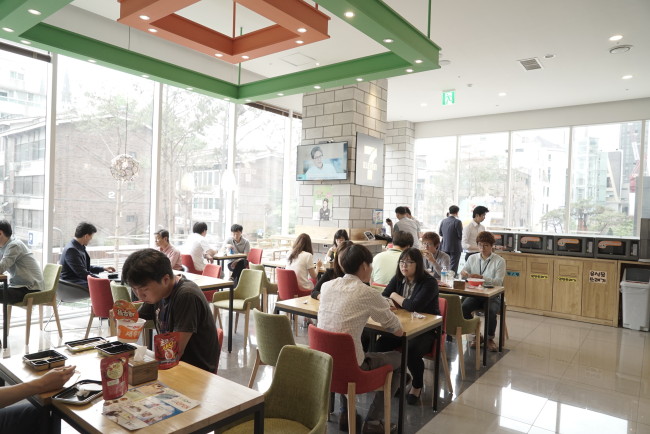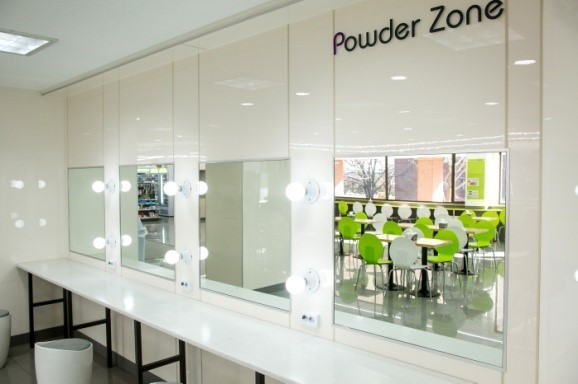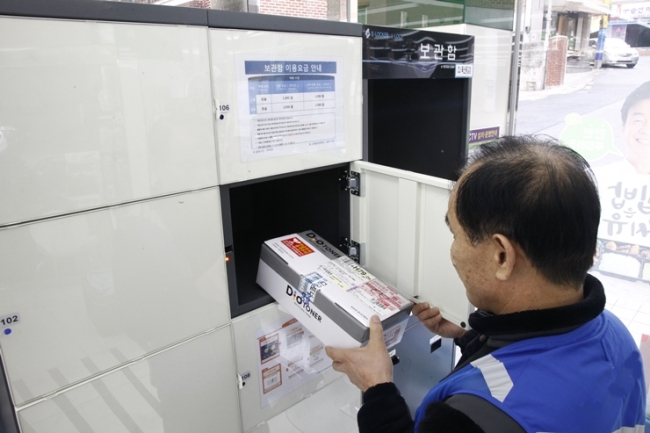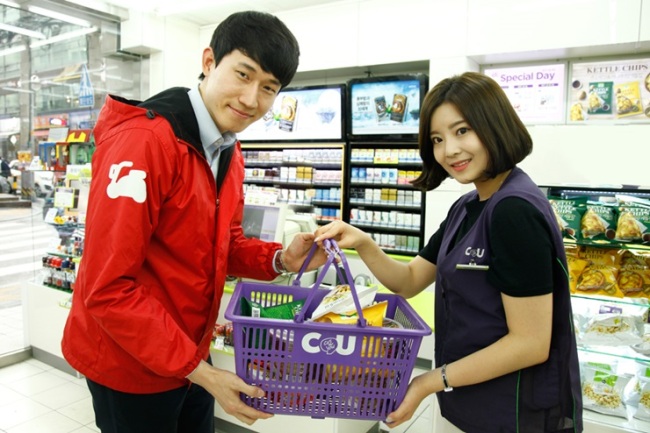South Korean convenience stores have evolved from simple 24-hour corner shops into all-in-one stopovers for foods, goods and services tailored to modern needs.
Despite sluggish consumption, convenience stores have constituted the country’s fastest-growing retail segment, outpacing offline retailers by a large margin with a 29.6 percent on-year hike in sales in 2015, according to Statistics Korea.
KDB Daewoo Securities analyst Lee Jun-ki predicts “a continued growth of Korea’s convenience stores” amid demographic shifts toward single-person households -- their main customer base.

The sector is expected to grow further with customer demand exceeding the supply of new branches in the market, he said in his report.
Even as the market sees a growing number of new convenience stores, operators or owners will stay in the black with the number of customers as well as the amount of money they spend there rising by a much larger margin, according to the analyst.
Despite promising market prospects, convenience store operators have been stepping up their marketing efforts to lure in more customers and survive the heated competition.
Take for instance CU, which is the country’s largest convenience store chain, operated by BGF Retail. It has been experimenting with its store format by adding unique services on top of its usual offerings.
A CU outlet in Itaewon, equipped with a set of coin lockers, has become popular among foreign tourists as well as those looking to enjoy a night out in the bustling neighborhood.

Other CU chains located inside university neighborhoods are targeting students by offering study rooms, laptops and printers. A branch near Duksung Women’s University even has a powder room and fitting room.
Meanwhile, 7-Eleven, a major convenience store chain operated locally by Korea Seven, opened a two-story “Lunchbox Cafe” store in Gangnam, southern Seoul, to better serve customers buying its prepackaged meals.
“Conventional convenience stores are usually cramped into small spaces, making it structurally impossible for them to offer customers enough room to enjoy their meals,” said a Korea Seven official.
“Our ‘Lunchbox Cafe’ outlets aim to break from this structure and set a new direction for the future of convenience stores toward multitiered services,” he said, adding that it has a similar outlet in Myeong-dong, central Seoul.
Looking to better serve customers who regularly purchase various ready-made meals, GS25, operated by the retail arm of GS Group, introduced its “lunchbox preorder service” through a new mobile app this month.
”The service aims to ensure that customers find their favorite lunchbox varieties at the branch they want at a given time,” said a GS Retail official.
The app also enables consumers to purchase “2+1” food products and save any extra items for another visit.
The popularity of online shopping has also prompted convenience stores to come up with services that cater to e-commerce.
Targeting single-person households in particular, CU introduced its “24-hour safe package storage service” in January this year.

Customers can arrange for a package to be sent to a CU branch, equipped with specialized storage lockers. When the package arrives, the customer receives a text message containing details of the locker number and a pass code. They then must pick up the item within 24 hours. The service costs 1,000 won (83 cents).
This service is not new, as other convenience store chains offer similar services in partnership with selected online shopping malls. However, CU’s service accommodates packages purchased from any retail store.
Convenience stores are also joining the likes of online supermarkets and quick delivery firms by launching their own product delivery services.
Last year, CU became the first in the industry to begin its own delivery service in partnership with local delivery service provider Butakhae.
Through a mobile app, customers can arrange for immediate deliveries for purchases above 10,000 won. The nearest CU branch will be automatically located through GPS technology.

This relatively new service is taking off especially among office workers as around 59.3 percent of CU’s delivery orders have come from corporate districts in Seoul, according to CU.
GS25 is planning to introduce a similar service with Korea’s telecom company LG Uplus this year. Meanwhile, 7-Eleven offers personalized delivery services for elderly citizens at four of its outlets in Seoul.
By Sohn Ji-young (jys@heraldcorp.com)








![[KH Explains] Hyundai's full hybrid edge to pay off amid slow transition to pure EVs](http://res.heraldm.com/phpwas/restmb_idxmake.php?idx=644&simg=/content/image/2024/04/18/20240418050645_0.jpg&u=20240419100350)






![[From the Scene] Monks, Buddhists hail return of remains of Buddhas](http://res.heraldm.com/phpwas/restmb_idxmake.php?idx=652&simg=/content/image/2024/04/19/20240419050617_0.jpg&u=20240419175937)

![[KH Explains] Hyundai's full hybrid edge to pay off amid slow transition to pure EVs](http://res.heraldm.com/phpwas/restmb_idxmake.php?idx=652&simg=/content/image/2024/04/18/20240418050645_0.jpg&u=20240419100350)

![[Today’s K-pop] Illit drops debut single remix](http://res.heraldm.com/phpwas/restmb_idxmake.php?idx=642&simg=/content/image/2024/04/19/20240419050612_0.jpg&u=)